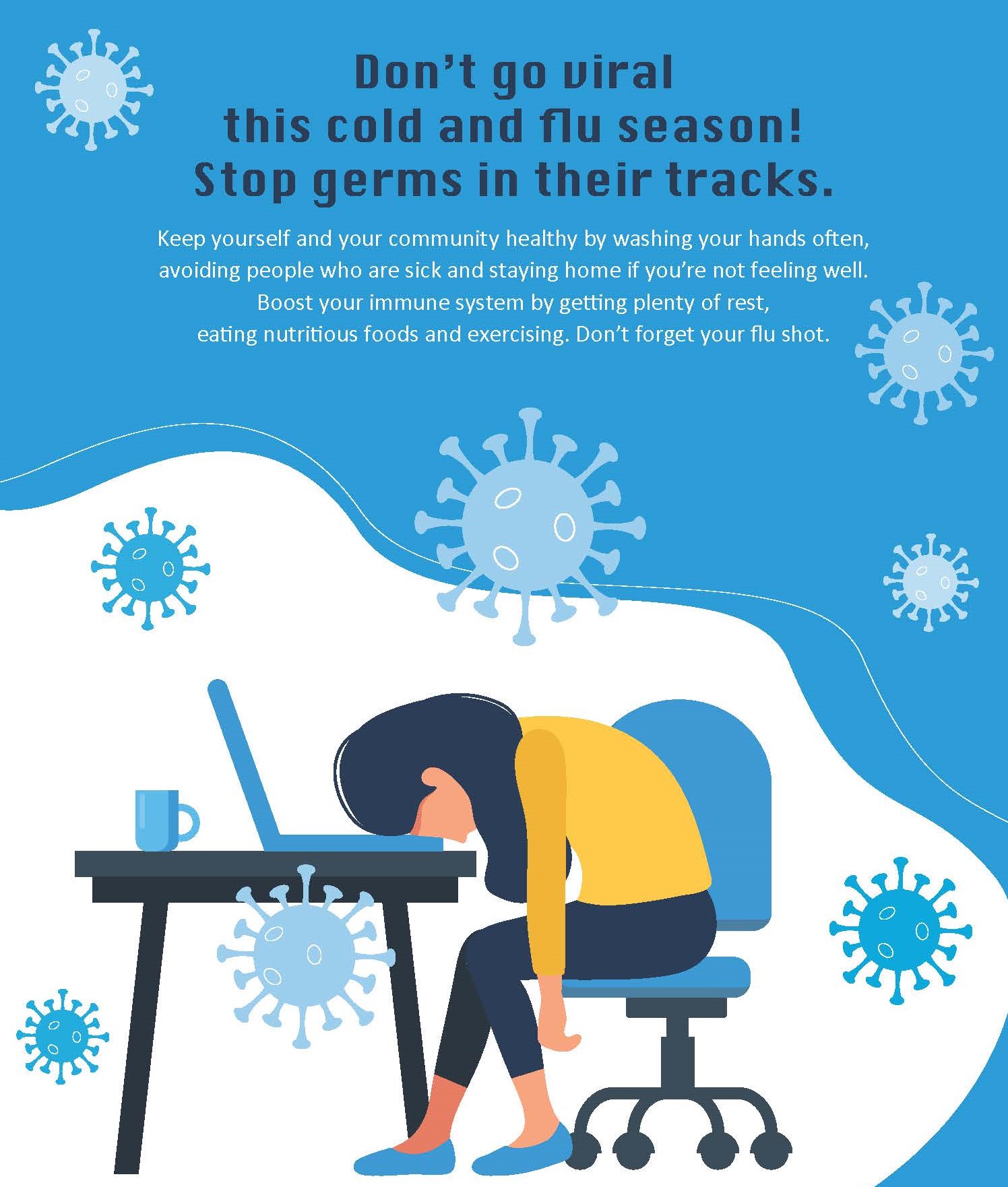Live Well
Stay Healthy This Cold and Flu Season

The moment you get that scratchy feeling in your throat, you know what’s coming: You’ve caught a cold, or maybe even the flu or COVID-19. But which is it, and how should you handle it? Here are some tips to help you diagnose and treat your illness.
Colds are likely to include these symptoms:
- Sneezing
- Congestion
- Sore throat
- Cough
If you have a cold, drink plenty of fluids and get your rest.
Flu often includes these symptoms:
- Fever
- Cough
- Sore throat
- Congestion
- Aches
- Chills
- Fatigue
- Headache
If you believe you have the flu, talk to your doctor about antiviral drugs. These prescription medications can be used to treat the flu and work best when taken as soon as possible.
Coronavirus may include these symptoms:
- Fever or chills
- Cough
- Shortness of breath
- Fatigue
- Muscle or body aches
- Headache
- New loss of sense of smell or taste
- Sore throat
- Congestion or runny nose
- Nausea or vomiting
- Diarrhea
Most people who contract COVID-19 experience mild symptoms and are able to recover at home. They should isolate at home to avoid spreading the virus.
Contact your doctor if you are concerned about your symptoms. Seek emergency care if you have trouble breathing, experience pain or pressure in your chest, feel confused or unable to stay awake, or if your lips or face appear bluish in color.
This cold and flu season, why not avoid all these symptoms completely? There are many commonsense steps you can take to prevent catching a bug in the first place.
Avoid Germs
Illnesses like the flu, COVID-19 and the common cold are spread by germs passed from a sick person to a healthy person. Germs can spread through the air when a sick person coughs or sneezes or through a frequently touched surface, like a doorknob. That’s why it’s so important to wash your hands frequently.
Wash your hands for at least 20 seconds using soap and water. Take your time and scrub your palms, the backs of your hands, between your fingers and under your fingernails. You don’t need antibacterial soap — regular liquid or bar soap will work just fine. Any water temperature will do.
Be sure to wash your hands:
- After using the restroom.
- Before eating and before, during and after food preparation.
- Before and after caring for someone who is sick.
- After touching garbage.
- Before and after treating a cut or wound.
If you can’t get to a sink, use hand sanitizer with at least 60 percent alcohol.
Along with keeping your hands clean, follow these tips from the Centers for Disease Control and Prevention*(CDC) to slow the spread of germs:
- Don’t get close to people who are sick. If you are sick, protect others by staying home.
- Prevent the airborne spread of germs by coughing or sneezing into a tissue or into the crook of your arm. Avoid using your hand, because that will cause you to spread germs to everything you touch.
- Never touch your face without washing your hands first. Illness can spread easily through the eyes, nose or mouth.
- If someone in your household is sick, clean and disinfect frequently touched surfaces to eliminate germs.
- Give your immune system a boost by maintaining a healthy lifestyle. Get plenty of sleep and exercise, drink lots of water and eat nutritious foods.
Get Vaccinated
Studies have found the COVID-19 vaccine to be safe and effective. It is widely available at no cost. The vaccine works by teaching your immune system how to recognize and fight the virus that causes COVID-19.
The vaccine may cause side effects. These usually last no longer than a few days and could include these symptoms:
- Pain, redness or swelling at the injection site
- Tiredness
- Chills
- Fever
- Headache
- Muscle pain
- Nausea
Some vaccines require two doses. Be sure to get your second shot as scheduled. You won’t have full immunity until two weeks after your second dose. To find a vaccination site near you, visit vaccines.gov, text your ZIP code to 438829 or call 800-232-0233.
Vaccines are also effective in preventing the flu. Serious cases of the flu can result in hospitalization or even death, which is why it’s so important to get your annual vaccination. Vaccines work. The CDC reports that in the United States during the 2019 – 2020 flu season, vaccines prevented an estimated:
- 7.5 million influenza illnesses.
- 3.7 million flu-associated medical visits.
- 104,000 flu-related hospitalizations.
- 6,300 flu-related deaths.
The CDC recommends everyone ages 6 months and older get a flu shot each year.
This cold and flu season, keep yourself and your loved ones safe and healthy by getting vaccinated and slowing the spread of germs.
*The Centers for Disease Control and Prevention is an independent organization that provides health information you may find helpful.
